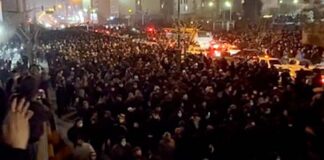For all the talk of aid to Haiti, the response to the tragedy was disgracefully slow. A BBC reporter touring the country five days after the quake hit reported that hardly any of the aid delivered to the country had been distributed. Thousands of US troops were preventing aid getting out, citing “security” concerns.
The US military seized control of the airport, prioritising military flights over aid missions. Médecins Sans Frontières was prevented from landing equipment on five separate occasions.
The earthquake that hit the country was natural, but the scale of the damage and suffering is not.
It is a product of Haiti’s poverty—the product of a history of slavery and imperialism.
A 17th century treaty, agreed by the European powers, gave the French government the colony of Saint-Domingue (today’s Haiti). By the 1780s Saint-Domingue was the most profitable colony in the world.
It became the world’s single largest producer of coffee and the source for around 75 percent of its sugar. Hundreds of thousands of slaves were hurled into this hell. Death rates were so high that at its worst the colony brought in around 40,000 new slaves a year. On 14 August 1791, the slaves rose up in a great rebellion, taking inspiration from the 1789 French Revolution.
The heroic uprising defeated the slave owners, beat back the French, British and Spanish armies and undermined the whole slave system.
Haiti became the world’s first black republic in 1804. But the great powers were determined to punish the country. They feared otherwise that Haiti would become a beacon of struggle, encouraging other slaves and colonies to resist.
The European powers now tightened the screw economically. Eventually France agreed that trade could be resumed—but only if its government agreed to pay compensation to the slave owners of 150 million francs (equivalent of about $35 billion today).
And although the sum was later cut to “only” 90 million francs, Haiti continued to pay until 1947. These payments meant crippling poverty for people in Haiti.
US intervention
In order to meet its “debts” to France, the Haitian government borrowed heavily from US banks. The US invaded Haiti in 1915 and occupied it until 1934 in order to police the debt repayments. It left behind a Haitian army which was determined to retain control by an elite, frustrate any movements for change from Haiti’s people and to support US-backed brutal dictatorships. In 1957, with army backing, Francois “Papa Doc” Duvalier became president.
In 1971, just before his death, “Papa Doc” handed over to his son Jean-Claude “Baby Doc” Duvalier. But the brutality of the regimes, combined with the imposition of neo-liberal economic policies, led to growing problems for Duvalier.
Outside interference was also economic. The US in particular pursued a strategy of forcing Haiti to open its economy—with devastating effects.
In 1986 a massive uprising overthrew “Baby Doc”. The International Monetary Fund (IMF) granted loans to Haiti on the condition that it agreed to structural adjustment programmes.
One agreement instructed Haiti to scrap a law mandating increases in the minimum wage when inflation exceeded 10 percent, further impoverishing Haitian workers.
The agreements prohibited subsidies to Haitian farmers—which would be “intervening” in the free market—while forcing Haiti to open its economy to highly subsidised US imports. Haitians became dependent on the global food market. Before 1950 Haiti produced more than 80 percent of its own food and also exported food. Today it imports 75 percent of its food.
The horrific consequences of this were seen in 2007 and 2008, when the global price of rice soared and ordinary Haitians found themselves priced out of eating.
The US did very well out of the policies. Between 1986 and 1989 the value of US agricultural exports to Haiti more than doubled from $44 million to $95 million. Meanwhile the poorest in Haiti were driven from the land into miserable urban slums.
US president Barack Obama has sent troops into Haiti in the aftermath of the earthquake. This has been sold as a measure to help ordinary people. But time and time again troops have gone into Haiti under the cover of humanitarianism, and the outcome has been disastrous for ordinary Haitians. Just as in Somalia, Iraq and Afghanistan, Western intervention has not solved the poverty that blights the lives of ordinary people. It has entrenched it.
The imperial powers have no benevolent interest in aiding the Haitian people. Their only thought is to continue their control of regions and resources.
By Sadie Robinson
www.socialistworker.co.uk





